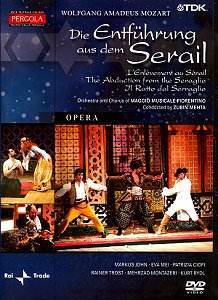We all remember the scene in Amadeus:
"Write us a proper German opera, Herr Mozart," says
the Emperor, in a bid to break the monopoly of ‘Italian trinkets’.
The result was indeed a truly German singspiel, but one laced
with the craze sweeping Vienna at the time, for all things Turkish.
In The Abduction from the Seraglio, Mozart was able
to demonstrate how the great universal themes of love and forgiveness
could be presented in a comic style that would appeal to the masses.
It is something of a dry run for his last great operatic masterpiece,
The Magic Flute.
This current production celebrates that very
element of vaudeville, and one can imagine the composer himself
loving it. It is conducted with great flair and ‘fizz’ by Zubin
Mehta, whose association with the piece goes back nearly forty
years. Indeed, anyone lucky enough to have his live Saltzburg
recording of Seraglio from 1965 (featuring, among others,
an incomparable Fritz Wunderlich) will know what to expect. Tempos
may have eased a little, but as the Overture makes clear, on the
right day Mehta can be as electrifying as anyone, and he drives
his medium-sized modern instrument pit band with great exuberance
and not a little panache.
The visuals are a treat. One suspects the director
may have been influenced by Ingmar Bergman’s famous pantomime-style
Magic Flute of a few years ago, or indeed the Twyla Tharp
‘authentic’ staging used in Amadeus. Whatever; the result
is a riotously uplifting comic entertainment. We get the first
hint during the Overture, when a toy ship sails shakily across
the stage, to be followed by Belmonte in his little rowing boat
with telescope. There is a huge Peter Pan-style crocodile, Osmin’s
personal pet, which rears up every so often to the delighted giggles
of the audience. The set consists of great sliding panels that
shift position to provide an effective and seamless flow of stylized
locations. They are heavily patterned with colourful squares and
mosaics, giving an ever-present reminder of the Turkish theme.
Costumes are appropriately flamboyant.
The vocal performances are also a delight. The
two young male leads both look and sound the part. Yes, it is
hard to get Wunderlich’s Belmonte out of one’s head (he also recorded
the part for Jochum) but Rainer Trost has a pleasingly light,
agile voice that is reminiscent of Leopold Simoneau, and he is
an able, musical tenor. Of the women, I was taken by Patrizia
Ciofi’s delightful Blonde, and wondered at first whether she shouldn’t
have swapped parts with the rather matronly looking Konstanza
of Eva Mei. That said, Mei is certainly on top of her fiendishly
difficult part, and her gloriously sung ‘Martern aller Arten’
(a pre-Queen of the Night coloratura spectacular) is only marred
by a tiresome series of bows to the audience afterwards. It’s
a pity, because this is the only occasion in the production where
this is allowed to happen, and it interrupts dramatic flow and
character credibility.
Veteran Kurt Rydl enjoys himself as Osmin, but
which bass wouldn’t? He milks every moment of ‘O, wie will ich
triumphieren’ and steals most scenes shamelessly. All the spoken
dialogue is included (as with the Glyndebourne Carmen,
a welcome move that fleshes out many plot intricacies) and mention
must be made of Markus John’s authoritative performance as Pasha
Selim.
There are no extras, but very generous cueing,
with 41 separate entry points. The booklet has a fairly perfunctory
note and brief synopsis. Sound is good and camera work intelligent
but not intrusive or fussy. The best news is that all two-and-a
quarter hours are on one disc, so it makes an eminently sensible
way to get the opera, given such first-rate singing and playing.
Recommended.
Tony Haywood
